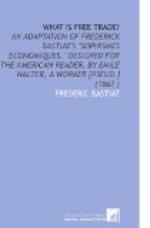P, is Sir Morton Peto and other European capitalists, who, believing that eight per cent., the average rate of interest in the United States, is better than three per cent., the average rate in England, invest $10,000,000 of capital in American enterprises. This capital is sent hither in the form of merchandise, to stock our railroads, farms, factories, etc., and is so much clear benefit to the country; but to Mr. Greeley’s solitary vision it is only a curse.
Q, and his friends are cozy old-fashioned merchants in Boston city, who own one hundred and seventy-nine vessels (see Consular Reports, 1865), which trade between foreign ports and away from the United States altogether. These vessels have an aggregate burden of one million tons, are worth forty dollars, gold, per ton, and earn a net profit per annum of ten per cent. on their cost. Although in this kind of carrying trade we are wofully behind other nations, yet it yields, in twelve years (the average age of the vessels engaged in it), the neat little profit of $48,000,000, which is invested by Q in tea, coffee, and sugar, and imported into the United States at a net profit of ten per cent. Although an unquestionable gain to Q and the country at large of $52,800,000, Mr. Greeley, with his contracted views, only regards it as a dead loss on the import side of our Commerce and Navigation Returns.
R, was a bank which had a defaulting cashier, who ran away in 1857 with $500,000 of its funds. (Sch*yl*r carried off a million of New Haven Railroad bonds). These funds were recovered and converted into gold, which was shipped to the United States. According to Mr. Greeley, who could find no record of exports to counterbalance it, the same was a dead loss to the country.
S, and his friends own 76,990 tons of whaling ships (see Commerce and Navigation Reports, 1866), worth $40 per ton, gold, or $3,079,600. These ships are sent annually to the Arctic regions and earn for S and his friends ten per cent., or $307,960 net profit each year. Five years’ profits, consisting of whale oil, bone, etc., which, after an active and profitable trade at the Sandwich Islands, they returned with this year, were valued at $1,655,659, and were duly entered among the imports, furnishing to Mr. Greeley an indubitable proof that the country was losing money in this business, and that the attention of Congress should at once be directed toward supplying a proper remedy.




